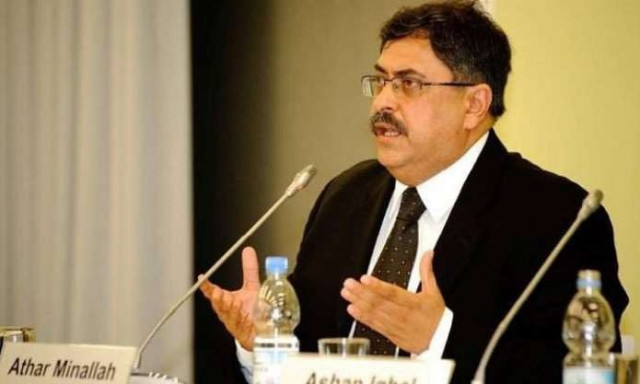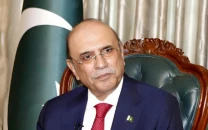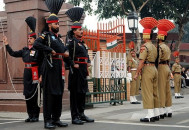Deadlock ends as JCP approves 3 HC judges’ elevation
Govt representatives in commission support CJ Bandial’s nominees

After nine months of deadlock, the Judicial Commission of Pakistan (JCP) approved the elevation of three high courts judges, including Islamabad High Court (IHC) Chief Justice Athar Minallah to the Supreme Court.
The JCP, however, by a majority of 5-4 did not approve the nomination of Justice Shafi Siddiqui, who is sixth on the seniority list of the Sindh High Court (SHC) Judges.
The JCP met here on Monday to consider four names for elevation to the apex court nominated by Chief Justice of Pakistan Umar Ata Bandial, who also heads the JCP.
The meeting continued for almost three hours during which heated exchanges took place between two senior judges, it is learnt.
It is also learnt that JCP unanimously approved the elevation of IHC Chief Justice Minallah, while the elevation of Justice Shahid Waheed and Justice Hasan Azhar Rizvi of Lahore High Court (LHC) was approved by majority of 5-4 votes.
The nomination SHC Justice Siddiqui was deferred by the JCP by a 5-4 votes after one member, Justice (retd) Sarmad Jalal Osmany dissented, saying that SHC Justice Aqeel Abbasi was a better option.
Three Judicial members, Justice Qazi Faez Isa, Justice Sardar Tariq Masood and Justice Syed Mansoor Ali Shah, opposed the nomination of three junior high courts judges as they supported seniority principle.
Pakistan Bar Council (PBC) representative Akhtar Hussain also opposed the elevation of all junior judges to the Supreme Court by supporting the seniority principle.
However, unlike the previous meeting, both the government representatives – Law Minister Azam Nazeer Tarar and Attorney General for Pakistan (AGP) Ashtar Ausaf Ali –endorsed the chief justice’s nominees.
They even supported the nominations of three junior high courts judges, who were not approved by them in the July 28 meeting.
However, when Justice Isa pointed out that nomination of three junior high courts was rejected, AGP Ashtar Ausaf Ali replied that on July 28 he recommended that those nominations should be deferred.
Last month, Chief Justice Bandial had linked the refusal by the government representatives to a court ruling regarding the election of Punjab chief minister.
Addressing the opening ceremony of the new judicial year, on September 12, the chief justice had said that the court was committed to defending the Constitution and it would not hesitate to act if the Constitution or the constitutional institutions were undermined.
The chief justice had pointed out that the political events taking place in the country since March had been accompanied by an avalanche of political cases, involving complex questions of constitutional law.
“One such case where the Court intervened was the ruling issued by the then Deputy Speaker of the Punjab Assembly on 22.07.2022,” Chief Justice Bandial said. “After a three day hearing the Court set aside the ruling of the Deputy Speaker and the result of the election on 26.07.2022.”
Continuing, he said that the decision prompted a sharp reaction from political quarters, who were disappointed by the judgment. He added that the displeasure of the federal government with the decision became evident two days later during a meeting of the JCP.
The commission, he said, had been convened to consider the names of five nominees for appointment to the Supreme Court. “These nominees were supported by four of the six judicial members of the commission,” he added.
However, he continued, “the representatives of the federal government in the commission either deferred or chose not to support the candidates proposed by the chairman”, adding: “As a result, the meeting had to be adjourned.”
“I ponder, does such a reaction by the federal government to an adverse decision of the court reflect any respect for the rule of law and the independence of the judiciary? I simply leave the matter there.”
Now, a debate has started as to why the government representatives changed their stance by supporting the nominations of junior high courts judges for appointments as the apex court judges.
It is learnt that there was pressure on the government to support the chief justice’s nominees. A government official said that the nomination of IHC chief justice was initiated on the government recommendation.
On the other hand, sources revealed to The Express Tribune that there were other factors regarding IHC Chief Justice Minallah’s elevation as powerful circles were upset on some of his judicial decisions.
Regarding the consequences of the government support to Chief Justice Bandial’s nominations, a lawyer said that it would be premature to say that the government might get some relief in some political-sensitive matters.
However, he added, a section within the Supreme Court, including two future chief justices, who were consistently supporting the nominations of judges on the basis of seniority principle, might have been disappointed.
A few Pakistan Muslim League-Nawaz (PML-N) lawyers wondered as to why the government did not think about the long-term objectives instead of supporting the elevation of junior judges.
It is being witnessed that support of the law minister to the elevation of of junior judges may affect result of upcoming Supreme Court Bar Association elections, which is being held on October 28.
Law Minister Azam Nazeer Tarar is one of the senior members of the Independent Lawyers Group, which is known as Asma Group.
Meanwhile, Justice (retd) Osmany’s refusal to support the nomination of Justice Siddiqui may have surprised many, especially Chief Justice Bandial. It is learnt that during the meeting, Chief Justice Bandial shared the reasons why he did not nominated three senior SHC judges.
However, Justice (retd) Osmany again said that Justice Abbasi, who is third on the SHC judges’ seniority should be elevated to the SC.
Currently, if these nominees are approved by Parliamentary Committee on Judges Appointment, the strength of the Punjab judges in the apex court will be eight, three from Sindh, two from Balochistan, two including Justice Minallah from Khyber Pakhtunkhwa (K-P).
Also, in case of the parliamentary committee’s approval, Justice Shahid Waheed will become the chief justice of Pakistan after the retirement of Justice Aysha Malik in 2031. Justice Minallah will continue as an SC judge till December 2026.



















COMMENTS
Comments are moderated and generally will be posted if they are on-topic and not abusive.
For more information, please see our Comments FAQ